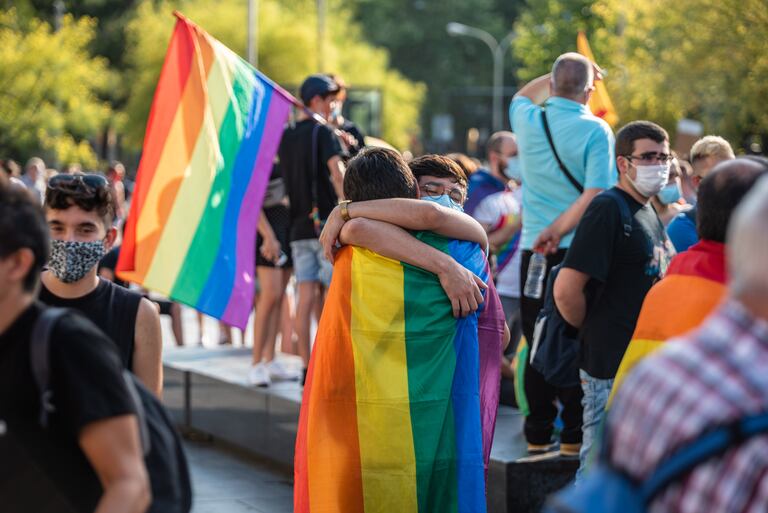Demonstration on Pride Day in Barcelona, in June 2020. Adria Salido Zarco / GTRES
The future Law for the Equality of LGTBI Persons [Lesbians, Gays, Trans, Bisexuals and Intersexuals] contemplates that “once formal equality has been achieved, the time has come to achieve real and effective equality”.
The promotion of this regulation is part of the government agreement between the PSOE and United We Can together with the controversial trans law, whose processing is being done in parallel.
The Ministry of Equality is already weighing a draft, which may undergo modifications in its processing.
It includes a wide range of measures and sanctions for those who do not comply with the law.
Among them, it contemplates fines of up to 150,000 euros for a very serious offense to people who promote conversion therapies for LGTBI people.
And it recognizes the specific existence and treatment of intra-gender violence, in same-sex couples.
These are the keys to the draft, to which this newspaper has had access:
Conversion therapies.
According to the draft, “the practice of aversion, conversion or counter-conditioning methods, programs and therapies” aimed at modifying people's sexual orientation, gender identity or gender expression is prohibited, even with their consent. or their legal representatives.
It is considered a very serious offense, fined 150,000 euros.
Equality provides for gender self-determination without a medical report from the age of 16
Congress will shield the rights of LGTBI people with a state law
Sanctions
Includes a large battery.
Among others, if a professional or entrepreneur denies a LGTBI person a benefit for their "sexual orientation, gender identity, gender expression or sexual characteristics" it is considered a serious penalty, fined up to 10,000 euros.
It would be the case, for example, of an establishment that refuses to celebrate a gay wedding.
The production or dissemination in educational centers of textbooks “that present people as superior or inferior in human dignity based on their sexual orientation, gender identity, gender expression, or sexual characteristics is also a serious offense.
Intra-gender violence.
Violence within same-sex couples is recognized in the draft of this law as “comprehensive” as stated in the 2004 law on gender violence for couples made up of a man and a woman.
It is recognized "regardless of whether it occurs during the relationship or after it ends."
Victims will have the right to counseling with available resources, psychological care and legal guidance, attention to "economic, labor, housing and social needs" and free legal assistance.
Intersex people.
Intersex people are those born with both male and female reproductive organs or "who do not correspond to socially established notions of male or female bodies," as the draft describes it.
The future rule prohibits "genital modification" operations on intersex newborn people "except in cases where medical indications require otherwise" to protect their health.
The parents may request that the mention of the baby's sex in the Civil Registry "appear blank" for a maximum period of one year.
Filiation of babies born to unmarried women.
The law also solves a problem that dragged on from the regulation of equal marriage.
Despite the attempts of the promoters of the 2005 rule to avoid any difference between couples of the same or different sex, one aspect remained unregulated: how to process the filiation of a baby when it is the son of a couple of unmarried women.
In the case of those formed by a man and a woman, it is enough for the man to assume paternity.
But in the case of lesbians, this was not allowed, and for the biological mother's partner to appear as the parent of the newborn, they have to adopt it, which means a processing time during which the second mother has no rights or no obligation to the child, or the little one over her;
it costs money and, above all, it involves discriminatory treatment towards different-sex couples.
In the draft, article 120 of the Civil Code is modified so that for non-matrimonial filiation it will serve that "at the time of registration of the birth", the "father or non-pregnant parent" makes a "conforming declaration in the corresponding official form ”.













/cloudfront-eu-central-1.images.arcpublishing.com/prisa/IGZ7GOCXZ5GUPAQ2HWGK6Z76BU.jpg)